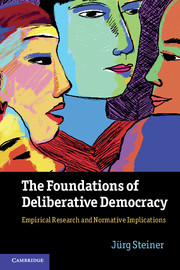Book contents
- Frontmatter
- Contents
- Figures
- Acknowledgments
- Introduction
- 1 Citizen participation in deliberation
- 2 Rationality and stories in deliberative justification
- 3 Common good and self-interest in deliberative justification
- 4 Respect in deliberation
- 5 Public openness of deliberation
- 6 Force of better argument in deliberation
- 7 Truthfulness in deliberation
- 8 Deliberation in the media and the Internet
- 9 Favorable conditions for deliberation
- 10 Favorable consequences of deliberation
- 11 The praxis of deliberation
- Appendix Newest version of Discourse Quality Index (DQI)
- Index
- References
4 - Respect in deliberation
Published online by Cambridge University Press: 05 August 2012
- Frontmatter
- Contents
- Figures
- Acknowledgments
- Introduction
- 1 Citizen participation in deliberation
- 2 Rationality and stories in deliberative justification
- 3 Common good and self-interest in deliberative justification
- 4 Respect in deliberation
- 5 Public openness of deliberation
- 6 Force of better argument in deliberation
- 7 Truthfulness in deliberation
- 8 Deliberation in the media and the Internet
- 9 Favorable conditions for deliberation
- 10 Favorable consequences of deliberation
- 11 The praxis of deliberation
- Appendix Newest version of Discourse Quality Index (DQI)
- Index
- References
Summary
Normative controversies in the literature
There is agreement in the normative literature that mutual respect in the senseof reciprocity is a key element of good deliberation. Thisholds for both speakers and listeners. As Jane Mansbridge etal. put it, “participants should treat one another with mutualrespect and equal concern. They should listen to each other and give reasons toone another that they think the others can comprehend and accept.” Suchmutual respect requires, in the words of Amy Gutmann and Dennis Thompson,“an effort to appreciate the moral force of the position with which wedisagree.” There is controversy, however, about the exact definition ofrespect and whether respect should be extended to all arguments or whether thereare arguments that are so distasteful that they do not merit respect.Jürgen Habermas takes the position that all arguments should beconsidered and that good reasoning will allow the cutting of distastefularguments from further discussion. This Habermasian position is forcefullyarticulated by Christian F. Rostbøll who shares with Habermas abackground in critical theory of the Frankfurt School. For Rostbøll, a“basic assumption underlying deliberative democracy, as I see it, is thatno one has privileged access to truth or to the true interests of others. Theonly way to arrive at judgments that have the presumption of having right ontheir side is through public process of deliberation where everyone is free andable to participate.” Italo Testa, another theorist, sets out hisposition in the title of his paper, “Limits of Respect in PublicDialogue,” arguing that not anything goes in political debate:
Respect for the legitimacy of values, beliefs, and preferences should not beconferred a priori, as unconditional and un-retractable.Were it so, we would have as a consequence that anythinggoes: there would be no way to distinguish between legitimate andillegitimate claims, and dialogue would defeat itself and its validitystructure … there will always be some views that we won’t holdas respectable: and this is not a bad thing in itself.
Testa makes the distinction between respect for arguments and respect for personsmaking arguments. He is of the opinion that there are not only arguments butalso persons that do not merit respect.
Information
- Type
- Chapter
- Information
- The Foundations of Deliberative DemocracyEmpirical Research and Normative Implications, pp. 104 - 124Publisher: Cambridge University PressPrint publication year: 2012
